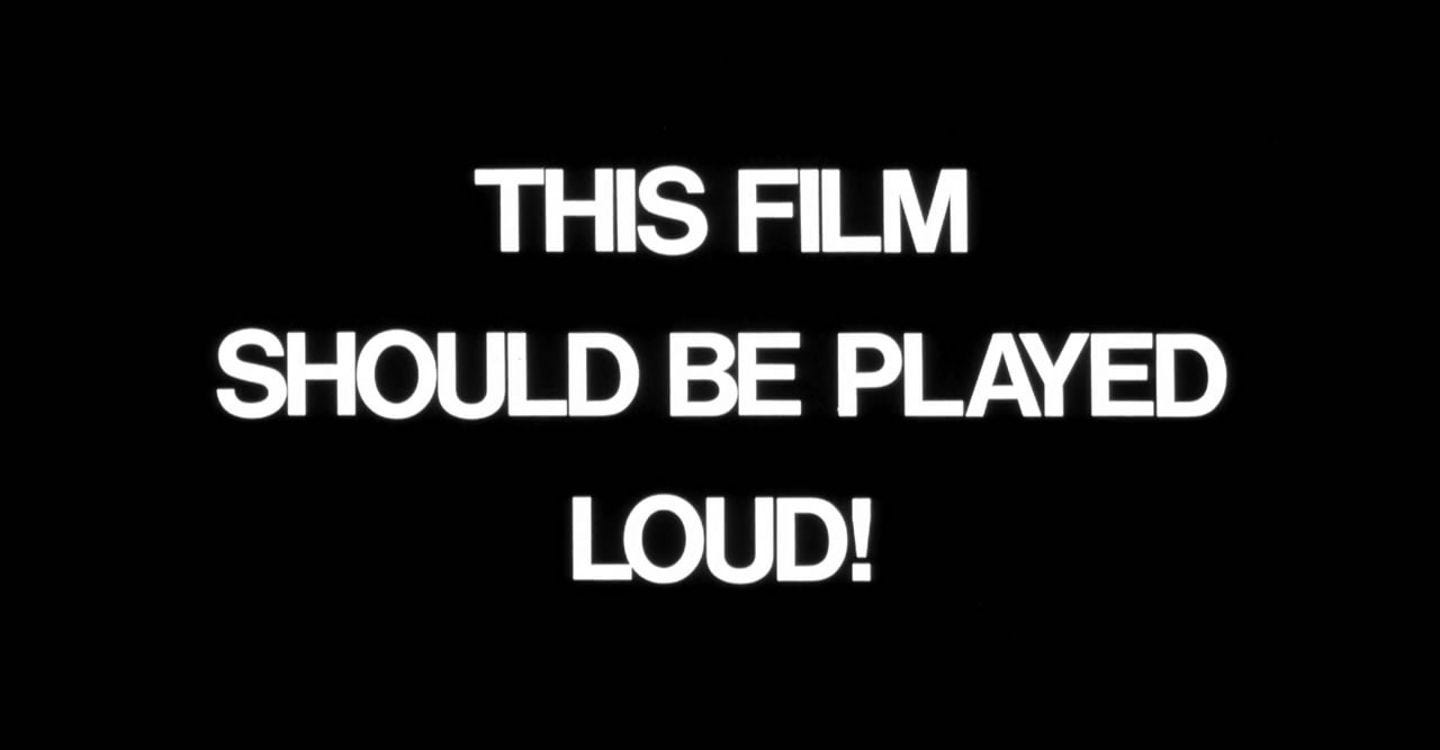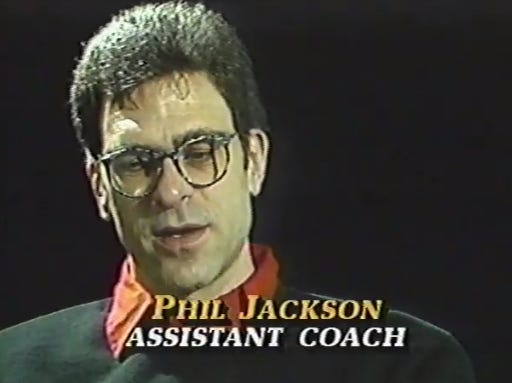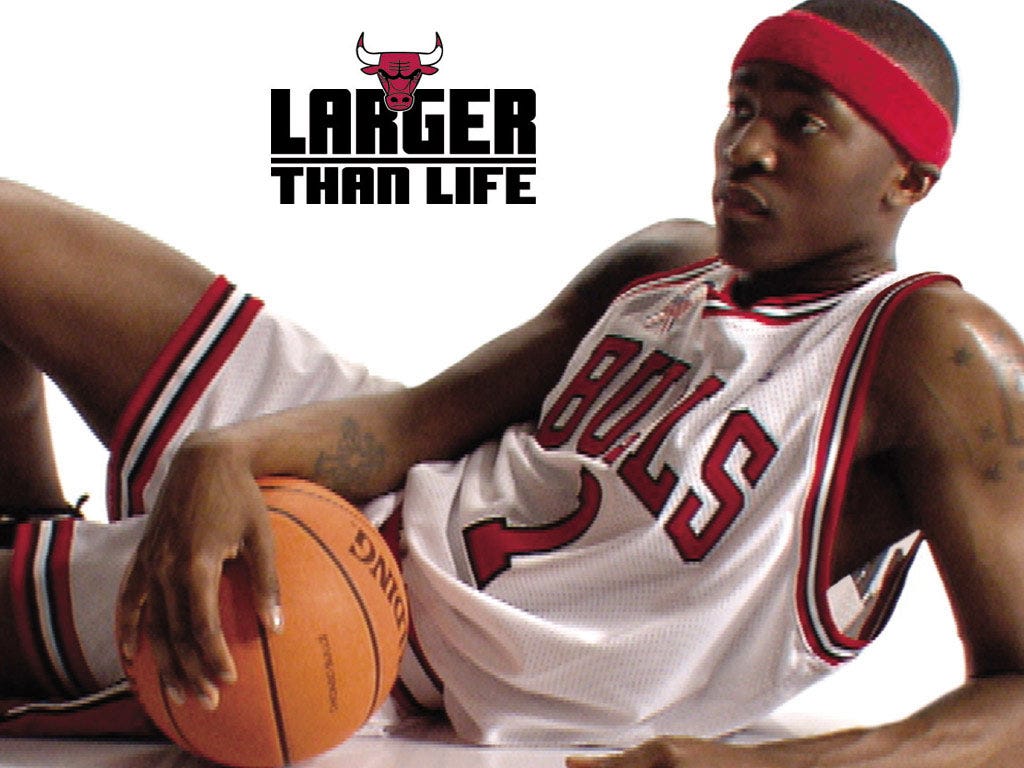The 1999 Bulls weren't gonna go 50-0
Recently, while joking, Scottie Pippen and Dennis Rodman agreed that the 1999 Chicago Bulls could have gone 50-0 had the franchise returned 1998’s championship core.
This reunion included not only free agents Pippen and Rodman but also Michael Jordan and Phil Jackson, with Jackson’s clinching far less certain than the rest. Splayed out over an NBA season shortened to 50 games due to the NBA’s owner lockout, Pippen and Rodman appear to believe the club’s spirit and cohesion would have blended well over the course of a cut-rate regular season.
If they had Michael, of course.
And Phil.
Really, what would have gotten in Chicago’s way?

THE CAP
The NBA introduced its new Collective Bargaining Agreement in the first month of 1999, after locking its players out for over six months. The Larry Bird rules remained in the new CBA, teams could and can still go over the salary cap to re-sign (most of) their own free agents, but the rest of its writing detailed little outside of constraints.
Maximum salaries were introduced, mid-level exceptions were created in order to develop a semblance of “NBA middle class,” and the salary cap was raised by $3.1 million to $30 million for the 1999 season.
Michael Jordan alone ($33.1 million) made more than this number the season before, he and the rest of the outsized money-makers (Kevin Garnett, Alonzo Mourning, Shaquille O’Neal, presumably Patrick Ewing) were allowed a grandfather clause and the ability to make a percentage on top of whatever largess each entered the post-lockout world with.
This meant that Jordan could push for at least a $36 million deal in 1999, even with only 50 games on the docket. MJ earned less than $10 million from the Bulls during the team’s first three-peat, and $3.85 million from Jerry Reinsdorf during the 72-win season, he could have pressed.
Had Jordan taken a massive paycut, as Charles Barkley did in 1999 in order to clear up Houston’s cap sheet, the order may have gone a little different. MJ worked for the minimum during his two seasons in Washington, it wasn’t out of the question.
The problem was the rest of the roster. Reinsdorf got away from these guys in the nick of time.
Every Bull but Ron Harper, Toni Kukoc, Randy Brown and Keith Booth were free agents after the 1997-98 campaign. Scottie Pippen, Luc Longley, Steve Kerr and Jud Buechler were valued members of the 1998-99 free agent list, and Pippen (the 122nd-highest paid NBA player in 1998) was looking for the newly-enshrined “max deal.”
He’d get it, signing with the Bulls for as much as the new Collective Bargaining Agreement would allow prior to Chicago’s sign-and-trade agreement with Pippen’s selected home in Houston: five years, $67.2 million, $11 million for Pip’s work in 1999.
Kerr (five years, $11 million in San Antonio), Longley (six years, $32 million in a sign-and-trade with Phoenix), Buechler ($850,000 with Detroit; which probably included an under-the-table deal for 2000, when he signed a three-year, $11 million deal) and Scott Burrell (one year at $1 million with the Nets) all cribbed deals that basically paid each back for their efforts in Chicago.
Had the free agents remained in Chicago, each of the numbers save Pippen’s would have shot up.
The Bulls were on the hook for $12.43 million in salaries due to Harper, Brown, Kukoc, Booth and rookie Corey Benjamin in 1999. Pippen, pissed as hell at Jerry Krause for a decade at this point, would not have agreed for anything less than that, bag: $11 million.
That’s six players and 78 percent of the salary cap before we even get to Michael’s decision, Luc Longley’s prospects, Bill Wennington’s $1 million re-sign, or whatever to do with Mssrs. Kerr and Buechler.
Each of these men were in their 30s, as well, and it certainly showed the season before.
Chicago won its 1998 title with basically an eight-man rotation, with Longley and Harper dragging around tired legs and Pippen barely able to walk due to compromising back woes.
Even if the Bulls were able to land a single stellar helper — the team did sign 27-year old Brent Barry to a six-year, $27 million deal in 1999 — the machinations would only have lurched a short way toward dissolving the depth problem Chicago exhibited at every position.

THE COACH
Phil Jackson needed a break, he had been at this mill for a decade by 1999 and, like most others associated with the Bulls during the final three-peat, Phil was keen to be known for something beyond acting as Michael Jordan’s co-worker.
His marriage was crumbling, Jackson’s hips and back badly bothered him, and there was the promise of Bill Bradley’s campaign for the 2000 Democratic presidential nomination to consider contributing time to.
There was also growing intrigue in Los Angeles, where the Lakers were badly flailing under coach Del Harris. Harris, his club besotted with bickering and the unasked-for presence of Dennis Rodman, wouldn’t make it through the 1999 season.
Jackson rode away from the Bulls’ practice facility on a motorcycle in June, 1998, vowing that he’d keep his word. The 1997-98 season was the last waltz, Jackson had other booming appointments to make.
Phil Jackson didn’t want to coach that team.
Jerry Krause (who declined to invite Jackson and his wife to Krause’s daughter’s wedding in 1997) long ago made life untenable for the coach he plucked from CBA obscurity. Michael Jordan probably wanted to play NBA basketball after the lockout, but Jackson’s overwhelming antipathy toward his boss and Bull culture put the kibosh on any chance of a return.
THE FLOYD
In one of the lamest press conferences in NBA history, the Chicago Bulls introduced Tim Floyd as the team’s new president of basketball operations in July, 1998. Floyd was given a five-year, $8 million deal to act as the Bulls’ … something.
Not the coach, not yet, not if Phil Jackson decided to come back. This was all up to Jackson, Jerry Reinsdorf offered, dripping with skeeve:
“Every time we’ve asked Phil to come back he’s said he doesn’t want to come back,” Reinsdorf explained.
“We’re going to try one more time, and maybe Michael can talk him into it.”
Jackson’s agent, Todd Musburger, tried to pull the curtain.
“There is no reasonable expectation that Phil would reverse his decision,” Musburger shot back, soon after the press conference.
“Nor is there any reason to suspect that what occurred this morning in Chicago was a sincere effort.”
He’d go on.
“I viewed this morning as a transparent public relations maneuver for which Reinsdorf and Krause are quite well known.
“They appear to be very concerned about what Michael might do and they seem to be unwilling to be involved in responsibility for what Michael might do. They seem to be taking the arrow and pointing it in Phil’s direction.”
Jordan had not yet announced his retirement, yet his agent David Falk was nearly as stern:
“If you understood the level of criticism Bulls management will take if Michael doesn’t come back for any reason, then you could understand why they’ve gone to such elaborate lengths to posture the situation the way they have.”
Jackson claimed later that one of his final interactions with the Bulls front office included a discussion regarding Pacific center Michael Olowokandi, a late-riser who would eventually go to the Clippers with the top overall pick in the 1998 NBA draft.
Jackson remembers Bulls general manager Jerry Krause, stuck at the back of the draft with the No. 28 pick, comparing Olowokandi favorably to Tim Duncan, possibly preferring him to the reigning Rookie of the Year.
THE GENERAL MANAGER
Jerry Krause inherited Jordan, and it’d been a long decade since he’d been able to show off his scouting skills at a lottery level. Krause busied each of his 1999 sign-and-trades with draft picks, selections that would bear Ron Artest in 1999 and Jake Voskuhl in 2000.
The Bulls lost like mad in 1999 and earned the top overall pick, where Krause selected Elton Brand ahead of flashier types like Lamar Odom and Steve Francis. There wasn’t a lot of room to preen while introducing a steady, low-post presence from Duke.
The next season Jerry dealt his proudest project, Toni Kukoc, for a lottery pick in 2000 knowing full well that the 2000 draft was rather lacking. Krause was desperate for another Scottie/Horace Grant pull, and to Jerry’s credit he took a chance on teenaged swingman Jamal Crawford at No. 7 — the last active player from his draft class.

Jerry was champing at his bit, even after cobbling six championships out of the Jordan Era.
Re-signing each of his 1990s selections would have meant passing on the month-long 1999 offseason, the chance to sign Antonio McDyess, or the chance to dissuade members of the legendary 1996 NBA Draft class to delay signing extensions with their incumbent clubs.
Bringing the whole party back would have likely meant a litany of one-year deals, and the resultant noise that Krause would bring in lusting over any number of puppies available in the other 1999 offseason, or the Tim Duncan-rich 2000 offseason.
MICHAEL MESSED UP HIS FINGER
A season after playing 38.8 minutes per game with a mucked-up right wrist, MJ severely cut the index finger on his shooting hand during the extended lockout months, severing a tendon — the culprit was assured to be a cigar cutter, other recollections may vary.
Jordan attended his own retirement ceremony on January 13 with a brace on the finger, covering its gauze, telling reporters he’d hurt it only the week before. Kajillions of nerves float around just below the skin surface of those digits, there was a strong chance that the pointy-finger woulda been feelin’ no pain the entire season.
Palming was everything for Michael, as was his ability to grind the works and earn free throws. With the bum right wrist that rankled in 1997-98, though, Jordan shot a career-low 78.4 percent from the line. With the three-point line moved back after a three-year holiday spent at an even 22-feet, Jordan shot just 23.8 percent (30-126 in 82 games) at the line we now call home.
MJ underwent an operation on the digit in May after acknowledging in January that the finger would indeed require surgery. There’s no telling what his rotation would have looked like at the fin de siècle.

THE SEASON
The Bulls earned a remarkable 14-4 record on the second half of back-to-back games in 1997-98, the team tied for the best record in the league with 62 wins while ranking third (behind the Lakers, and Seattle) in point differential.
The offense dropped from tops overall to ninth between 1997 and 1998, though the group’s defense shot up from fourth to third even with Scottie Pippen missing 38 contests after left foot surgery.
The compressed 1999 NBA schedule featured 50 games performed in 89 days, a nightmare scenario for any group, let alone one featuring 1990s kids like Rodman (38 by the playoffs), Jordan (36 in February), Harper (35), Pippen and Kerr (33), plus youngsters Kukoc and Longley (30).
Rodman told Rachel Nichols that he and Pippen “had the legs for 50 games,” but we’re recalling scenarios incorrectly here — the NBA didn’t run 50 games from Halloween until April, it ran them all in a row: Chicago performed 14 back-to-backs during the 1999 season, and two back-to-back-to-back sets.
They weren’t playing scabs, either, the NBA was woefully out of shape and ill-prepared for the 1999 season but the competition was still on par.
Older teams with just as much recognition, the Pacers (who began practicing together in October, months before the lockout’s end) and Jazz, faded badly in the face of the march.
It took fresh blood — Knick Latrell Sprewell, suspended for the bulk of 1997-98, or 23-year old Tim Duncan — to make the largest impact.
NOW, A TITLE?
You wanna be the jamoke that bets against Michael? MJ up against the team with Jaren Jackson at shooting guard?
In 1997, the Bulls outlasted the San Antonio Spurs in Tim Duncan’s first month in what was probably the ugliest Bulls win of the Rodman era.
With Pippen sidelined and a tubby Toni Kukoc still sweating his summer off (he was sidelined with plantar fascia issues), each team needed 58 minutes to combine for 170 points as the Bulls hung on for an 87-83, double overtime win.
Jordan (13 rebounds, four assists, five steals, two blocks, three turnovers) needed 39 shots for his 29 points:
A spring later, with Pippen in the lineup and Tim Duncan clearly on his way to superduperstardom (“I’ve seen the future,” Charles Barkley gushed after a preseason game against San Antonio, “and he wears No. 21”), Chicago lined up for another shot at the rookie on his home floor.
Toni Kukoc was spindly again by March, he’d been starting at center for Chicago for a month alongside Rodman, Pippen, Jordan and Ron Harper. Nothing but long arms.
The Bulls would need them against San Antonio’s frontcourt: David Robinson didn’t lie down, the Admiral parked 35 points on 23 shots in the win largely against ex-teammate Dennis Rodman.
Kukoc, meanwhile, forced Robinson out of the paint and fronted either big man in the face of potential entry passes. Jordan doubled, the 6-7 Scott Burrell crashed, Harper lunged, there wasn’t a lot of room for the basketball to slip through in this game.
With center Luc Longley (who worked 46 minutes in November’s win over the Spurs) sitting with a left knee sprain, Rodman worked wonderfully against Duncan (7-15, 14 points, five turnovers). Kukoc’s fronting defense surprised even the Bulls’ coaching staff.
Veteran pivotman Joe Kleine defended well in five spot minutes but the Bulls went the length of the 96-86 win without relying on 7-footers — reserve center Bill Wennington only worked 128 seconds.
“You know they’re going to come in loaded for bear, and they were,” said San Antonio coach Gregg Popovich, weirdly. “We went after him every which way we could.”
Rodman finished with 16 rebounds in 46 minutes, devoting most of his energy toward position defense, compiling two steals and four steals in the winning effort. Coach Phil Jackson wanted to practice the next day, a Sunday back at home in suburban Chicago’s Berto Center, D-Rod had other ideas:
[…] after the game, he said, “I took a hell of a beating. I shouldn't have to go to practice.”
I said, “It’s at noon. You can make it there by noon.” And he said, “What if I don’t come?” And I said, “I'll fine you. Triple.”
That’s nothing; it's just three times $250. But he showed up. He was late, but he showed up. The thing was, he was losing interest. Not in practice, but in basketball generally.
One day he didn't show up at all. He lives so close he could walk to the Berto Center in 10 minutes. So I sent somebody over to get him, and Dennis was there eating Sugar Pops from a bowl, and he said, “I can’t make it. Can’t do it.”
So I went over there later, and he was there on his mattress on the floor in front of a huge TV screen that almost fills a wall, with an immense stack of videos. I told him, “It's a downhill shot from here. It gets easier. The playoffs are coming.”
Rodman turned 37 during the 1998 postseason. Keeping his eye on the ball in 1999, even with the shortened schedule, would have taken quite a bit of effort: Dennis spent huge chunks of the 1998 playoffs jetting to Las Vegas during off days, flipping both sides of the coin until it landed on its edge.
Every Bull was ready to either take a break, move on, or explore new fascinations. Even with a 50-game season, even after taking October-through-February off, the task of keeping this outfit championship-steady would have acted as Herculean, and Phil Jackson has lost plenty of locker rooms in the years since.
THE RECORD
Given the complexities of schedule, age, ennui and the three-time champion’s dimming supremacy, a 50-0 season seems like the joke it was introduced as. The Bulls don’t get extra points just for being the Bulls.
No way they’d get 50, not without Ditka involved. I’d give the team a 46-4 mark, tops. Maybe 47 wins.
I KNOW
Thank you for reading!
Our season previews begin on Monday, those are for subscribers, and now would be a pretty solid time to subscribe. Lengthy season previews with a Never Too Much podcast episode for each club followed by nothing but Behind the Boxscore until spring, what’s not to dig?
Switch down from name-brand soda water to store brand, and after two cases you’ve saved yourself enough to hop on for a month’s worth of season previews.
Support independent hoops.
(More to come.)



